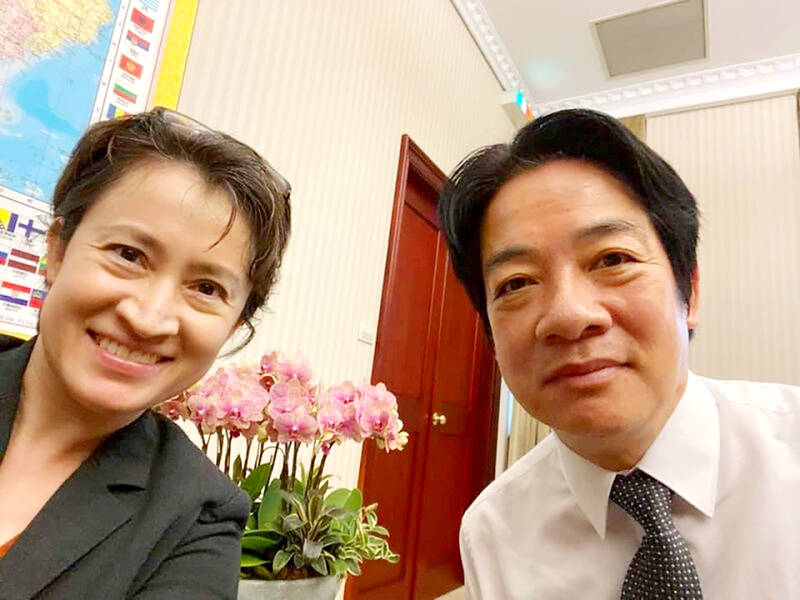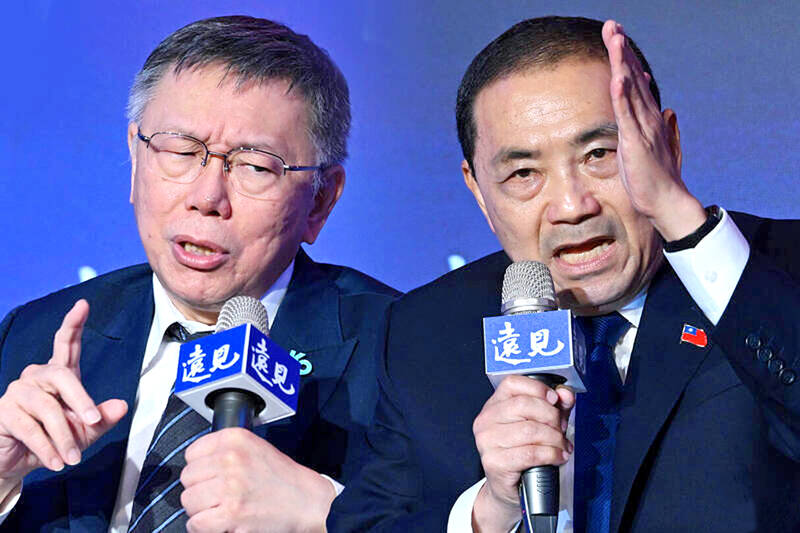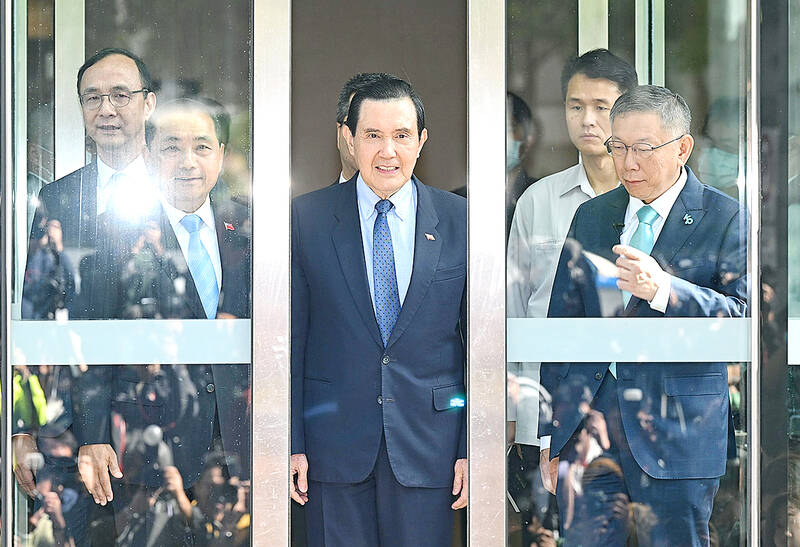The announcement on Wednesday of a joint-ticket between the Chinese Nationalist Party (KMT) and the Taiwan People’s Party (TPP) for January’s presidential election, surprised many. With TPP Chairman Ko Wen-je (柯文哲) insisting on public polling to determine whether he or KMT candidate Ho You-yi (侯友宜) would lead the coalition, and the KMT reluctant to acquiesce, an impasse seemed to have been reached. The decision of former KMT President Ma Ying-jeou (馬英九) to endorse Ko’s preferred method, may have swayed things.
Prior to Ma’s intervention, cooperation on the presidential ballot appeared unlikely, despite an agreement to team up for the legislative elections, which will be held concurrently. Indeed, many analysts saw the protracted wrangling over potential collaboration as performative.
“They want to appear like they’re willing to compromise,” says Nathan Batto, a research fellow at the Institute of Political Science, Academia Sinica, ahead of Wednesday’s announcement. “It makes them looks reasonable.”

Photo from Hsiao Bi-khim’s Facebook
With polls showing a significant chunk of supporters from both sides favoring cooperation, there was pressure to be seen as open to such an arrangement.
“They can’t just ignore that,” says Batto, who runs a popular blog on Taiwan’s elections called Frozen Garlic. “Their supporters think they should cooperate, because the most recent polls say a joint ticket would outright win.”
This, Batto, notes would be the case regardless of who heads the slate, with either combination shown as winning by 10 percent.

Photo: Chen Yun, Taipei Times
With the deal now sealed, the question of who will lead the charge to dethrone the ruling Democratic Progressive Party (DPP) must be resolved by Nov. 24 — the deadline for registration of presidential candidates. Either way, there will be concerns about what a presidency under either candidate portends for cross-strait relations.
While Hou repeats the familiar KMT talking points on the sanctity of the so-called “1992 consensus,” Ko remains elusive on the specifics of his China strategy. For many observers, it seems like he doesn’t have one.
FLIPPANT ATTITUDE

Photo: Chang Chia-ming, Taipei Times
Alice Su (蘇奕安), senior China correspondent for the Economist, says that Ko had tried to divert from the issue in a recent interview with her, calling it a “meaningless topic.”
Su was speaking as part of a panel on Taiwan’s elections at the Second Berlin-Taiwan Conference, which was held in the German capital on Monday and Tuesday.
Ko told Su that, as the stand-off hadn’t been resolved after all these years, it was better to focus on domestic issues. While accepting that this approach plays better with younger voters, who are seen as one of Ko’s key demographics, Su questions the former Taipei mayor’s flippancy on such a serious issue.
“If you want to be president of Taiwan you need to have a cross-strait platform,” says Su, .
When Ko is pushed, he will reluctantly give an answer of sorts, Su says.
“His policy is actually much closer to the KMT’s: He wants to resume dialogue with China, he wants to say things that Beijing likes to hear, like, ‘We are all Chinese; we all share the same culture.’”
Gunter Schubert, chair of Greater China Studies at the University of Tubingen in Germany, went further in his criticism.
“Ko is a joke as a presidential candidate,” says Schubert, who is also director of the university’s European Research Center on Contemporary Taiwan. “He’s unable to speak out any clear policy and has absolutely no stance on cross-strait policy.”
THEATER OF THE ABSURD
However, Schubert believes Ko appeals to “those frustrated and angry young people” who are sick of a politics premised on political point-scoring at the expense of a genuine commitment to addressing domestic concerns. This disillusionment, Schubert says, is not without foundation.
In a similar vein to Batto, who has highlighted the “theater” behind much of Taiwanese politics, Schubert argued that the public has cottoned on to “staged difference” between the major parties. With little separating the main candidates on domestic policy, Schubert says the once genuine divergences on cross-strait policy are now contrived to resonate with voter bases.
Maintaining that there is “an overarching consensus” on relations with Beijing — a view he first aired in a controversial paper on the 2004 elections — Schubert says there are no real differences in the approaches of the main candidates to cross-strait policy.
“The DPP aims at maintaining the current status quo; the KMT pretends that it can provide for a more stable status quo; the TPP promises it can provide the best status quo; and [Hon Hai Precision Industry Co founder and independent presidential candidate Terry] Gou suggests that it’s all the economy stupid.”
CHANGE OF FOCUS
Conceding that his view is “provocative,” Schubert argues that the elections are “irrelevant” as there is “no space for Taiwanese agency” in a situation that has now become an international issue. In his discussions with Chinese academics and policy advisors, Schubert says the general attitude is: “it would be nice if the KMT won, but we don’t care.”
William Yang (楊晧暐), a freelance correspondent for Voice of America, agrees that there is little difference between the parties on foreign policy. However, he says that Lai’s experience makes him much more qualified for dealing with important foreign partners such as the US and EU — one that could be helped by the news that Lai might pick Representative to the US Hsiao Bi-khim (蕭美琴) as his running mate.
“The only candidate that has really tried to put out a foreign policy platform is [William] Lai Ching-te (賴清德),” says Yang, referring to the DPP’s presidential candidate. “If you try to search ‘foreign policy proposal, presidential candidates’ you see nothing from the other two.”
Yang also notes that there has been less focus on the China threat thus far than in the previous campaign, partly because of the focus on “the noises that have been coming out from the [KMT and TPP] … finger pointing, accusations and a lot of attention on trying to lure over the voters.”
Once the issue of the joint-ticket has been resolved, he predicts the issue would rear its head again.
“[By] next Friday we will know exactly how the election will pan out, and I think that’s when all these China-related you know topics will start to get more attention.”

In Taiwan’s politics the party chair is an extremely influential position. Typically this person is the presumed presidential candidate or serving president. In the last presidential election, two of the three candidates were also leaders of their party. Only one party chair race had been planned for this year, but with the Jan. 1 resignation by the currently indicted Ko Wen-je (柯文哲) of the Taiwan People’s Party (TPP) two parties are now in play. If a challenger to acting Chairman Huang Kuo-chang (黃國昌) appears we will examine that race in more depth. Currently their election is set for Feb. 15. EXTREMELY

Last week saw the appearance of another odious screed full of lies from the People’s Republic of China (PRC) Ambassador to Australia, Xiao Qian (肖千), in the Financial Review, a major Australian paper. Xiao’s piece was presented without challenge or caveat. His “Seven truths on why Taiwan always will be China’s” presented a “greatest hits” of the litany of PRC falsehoods. This includes: Taiwan’s indigenous peoples were descended from the people of China 30,000 years ago; a “Chinese” imperial government administrated Taiwan in the 14th century; Koxinga, also known as Cheng Cheng-kung (鄭成功), “recovered” Taiwan for China; the Qing owned

Jan. 20 to Jan. 26 Taipei was in a jubilant, patriotic mood on the morning of Jan. 25, 1954. Flags hung outside shops and residences, people chanted anti-communist slogans and rousing music blared from loudspeakers. The occasion was the arrival of about 14,000 Chinese prisoners from the Korean War, who had elected to head to Taiwan instead of being repatriated to China. The majority landed in Keelung over three days and were paraded through the capital to great fanfare. Air Force planes dropped colorful flyers, one of which read, “You’re back, you’re finally back. You finally overcame the evil communist bandits and

They increasingly own everything from access to space to how we get news on Earth and now outgoing President Joe Biden warns America’s new breed of Donald Trump-allied oligarchs could gobble up US democracy itself. Biden used his farewell speech to the nation to deliver a shockingly dark message: that a nation which has always revered its entrepreneurs may now be at their mercy. “An oligarchy is taking shape in America of extreme wealth, power and influence that literally threatens our entire democracy, our basic rights and freedoms,” Biden said. He named no names, but his targets were clear: men like Elon Musk